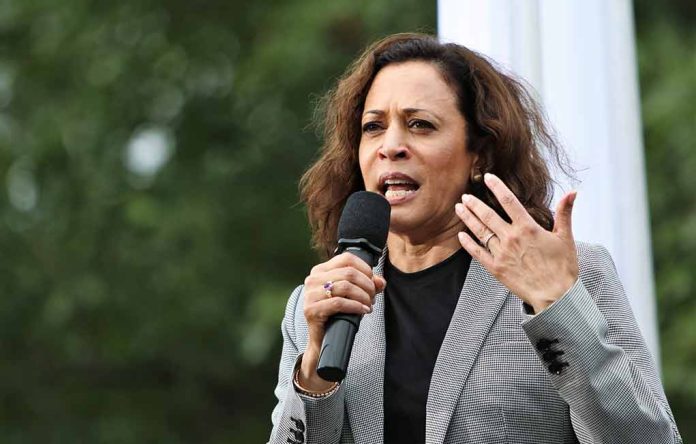
Vice President Kamala Harris faces accusations of dishonesty as she reverses her stance on fracking, sparking debate about her environmental commitment and political motivations.
At a Glance
- Harris has shifted from supporting a fracking ban to stating she would not impose such a ban if elected president
- Critics argue this reversal undermines her credibility on environmental issues
- Harris’s new stance is seen as crucial for her campaign, especially in key battleground states like Pennsylvania
- The policy change reflects a balancing act between environmental goals and economic interests
- Industry leaders welcome the shift, while environmental groups express disappointment
Harris’s Fracking Flip-Flop
Vice President Kamala Harris has come under fire for what appears to be a significant reversal in her stance on fracking. Once a vocal supporter of banning the controversial oil and gas extraction method, Harris now emphatically states she would not impose such a ban if elected president. This stark shift has raised eyebrows and sparked debate about the authenticity of her environmental commitments.
In a recent statement that has caught the attention of both supporters and critics, Harris declared, “As vice president I did not ban fracking. As president I will not ban fracking.” This stands in sharp contrast to her previous position, where she had stated, “There’s no question I’m in favor of banning fracking.” The reversal has left many questioning the motivations behind this change and its implications for her broader environmental policy.
Kamala Harris said she would not ban fracking if elected, her first time addressing her shift from her Democratic presidential bid when she vowed to outlaw the practice.
Follow along live: https://t.co/N4gniuXg08 pic.twitter.com/5kPdovgFLa
— The Hill (@thehill) August 30, 2024
Political Implications and Battleground States
Harris’s revised stance on fracking is widely seen as a strategic move, particularly aimed at improving her electoral prospects in key battleground states like Pennsylvania. With 19 Electoral College votes at stake, Pennsylvania’s energy-dependent economy makes fracking a crucial issue for many voters. The vice president’s shift appears to be an attempt to distance herself from policies that could be perceived as harmful to the state’s economic interests.
“She’s against fracking, she’s against oil drilling, she wants everybody to have one electric car and share it with the neighbors,” Donald Trump has claimed, highlighting the political sensitivity of the issue.
The United Association of Union Plumbers and Pipefitters, a significant labor organization, has endorsed Harris, noting her revised position on fracking. This endorsement underscores the delicate balance Harris is attempting to strike between environmental concerns and economic realities.
Industry and Environmental Group Reactions
The response to Harris’s policy shift has been mixed. Oil and gas industry leaders have cautiously welcomed the change but are seeking more clarity on her overall energy vision. Dustin Meyer, head of policy at the American Petroleum Institute, expressed this sentiment, stating, “There are so many other critical energy policies where the vice president’s perspective remains an open question.”
“Trump’s false claims about fracking bans are an obvious attempt to distract from his own plans to enrich oil and gas executives at the expense of the middle class.” said a Harris campaign spokesperson.
On the other hand, environmental groups have expressed disappointment with Harris’s new stance. They argue that her shift undermines the urgent need for strong climate leadership and decisive action against fossil fuel extraction. This divergence highlights the challenge Harris faces in balancing environmental goals with economic and political considerations.
No Ban on Fracking: Kamala Harris Doubles Down on Fossil Fuels in Shift from 2019 https://t.co/RehIZIh7Tq
— Democracy Now! (@democracynow) August 30, 2024
Harris’s Defense and Future Implications
In defending her position change, Harris has attempted to frame it as a pragmatic adjustment rather than a fundamental shift in values. “I think the most important and most significant aspect of my policy perspective and decisions is my values have not changed,” Harris stated in a television interview. She now emphasizes the creation of clean energy jobs and the compatibility of environmental protection with economic growth.
As the debate over Harris’s fracking stance continues, it remains to be seen how this policy shift will affect her campaign and her ability to balance the demands of environmental advocacy with the realities of electoral politics. The controversy serves as a reminder of the complex interplay between environmental policy, economic interests, and political strategy in the American political landscape.
Sources:
- Harris once wanted to ban fracking. Trump wants voters in energy-rich Pennsylvania to remember
- Harris does not support fracking ban: Campaign official
- How Harris Can Put Trump on the Defensive Over Fracking
- Kamala Harris claims she will ‘not ban fracking’ as president in major policy flip-flop
- Harris once wanted to ban fracking. Trump wants voters in energy-rich Pennsylvania to remember
- Harris revises stance on fracking, raising energy policy concerns






